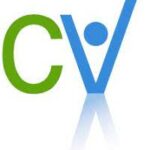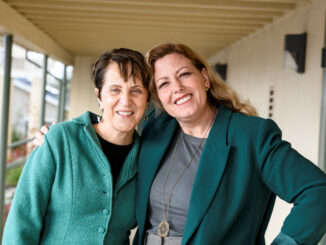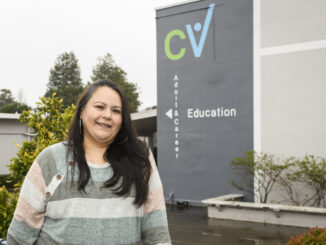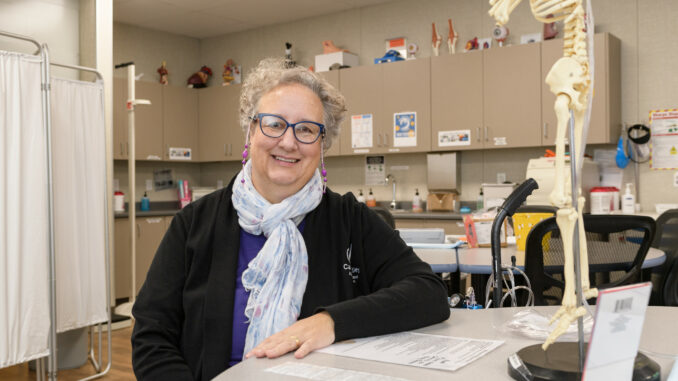
by Whip Villarreal
Teaching can be a challenge, and never has that been truer than in the last few years, when COVID created an unprecedented upheaval educators scrambled to work around. But adult students face a unique situation even without an international pandemic: holding down a job, caring for a family or navigating a new country, all while trying to attend school. The fact students are forced to overcome so many barriers, however, makes their teachers even more committed to seeing them succeed.
Elisa Dasalla
Elisa Dasalla, lead instructor for the Medical Academy at Castro Valley Adult & Career Education, is better known by students both past and present as “Mizz D.” A pivotal figure in the establishment of the Medical Academy, Dasalla has witnessed its evolution from a single class to a comprehensive program encompassing EKG, Medical Assisting, Medical Terminology and Community Health Worker.
“At first I taught in a classroom that was also used for computer classes for medical billing and insurance before the campus expanded,” recalls Dasalla. “Slowly, the classes filled up and we had to accommodate the increased demand and offer more classes. As word of mouth got out, more and more students continued to enroll and the Medical Academy has been steadily growing.”
Dasalla’s personal connection to adult education at an early age is a driving force that motivated her to pursue her teaching career. Born to a family of Portuguese immigrants, she didn’t speak English until the age of 6. She recalls her dad going to an adult school to learn English through an English as a Second Language course while simultaneously taking classes to obtain his U.S citizenship. She would sometimes accompany him to class and remembers how happy he was to get his citizenship.
“The generational impact of getting education from an adult school is huge,” says Dasalla. “People underestimate what an adult school does day in and day out. I have had previous students come up to me in places like Starbucks and say, ‘Mizz D, I’m going to buy your coffee.’ I try to politely decline and they insist and say things like, ‘If it wasn’t for you and the school, I wouldn’t be able to drive that car to take my kids to school’ or ‘I wouldn’t be able to pay my rent or mortgage.’”
She adds it’s easy to identify with her students in terms of the struggle they go through. Growing up as a non-native English speaker, there wasn’t much help available. She would be put into a class to practice English, but it often wasn’t helpful. She says she ended up having to learn English the hard way.
“Back then it didn’t occur to me that I might have had some undiagnosed learning issues or didn’t know how to learn effectively,” says Dasalla. “It wasn’t until I went to college and got much older that I realized maybe that’s why I didn’t do well in school as a kid. I didn’t know what my preferred learning style was—and adult school has that mastered. It’s the first thing we learn about students when they enroll. We assess them to understand how they prefer to learn and we offer different techniques to ensure their success. We really emphasize understanding our students and what’s the best way they learn by giving them lots of ways to understand the course material. At the Medical Academy, we never do it just one way, we show students different ways to grasp the material depending on what kind of learner they are.”
Joanna Lee
Joanna Lee has been making a significant impact on the lives of local immigrant communities through English as a Second Language classes at Castro Valley Adult & Career Education. Lee has taught for nearly six years at CVACE and doing this work is her way to help serve and lift her community.
Born and raised in the United States, Lee spent a few years living abroad in Spain and Tokyo and can speak multiple languages, including Spanish. Having lived overseas, Lee often empathizes with students who are newly arrived to the U.S. She is all too familiar with how it feels being new to a foreign country and being far away from family. This helps her connect with students.
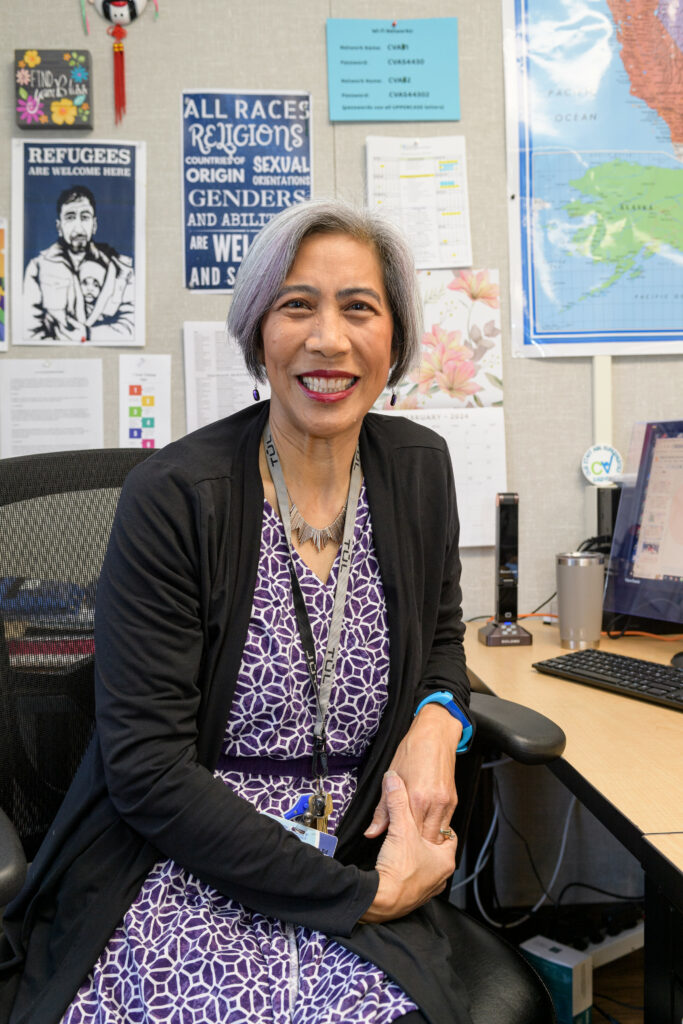
“I love language and can speak a couple of different languages so sometimes it encourages the students to speak with me in Spanish if they really need to,” Lee said. “I think they feel comfortable knowing that I know their language. Sometimes after class, students will come to me and confide in me about things they have going on or to get advice because they are comfortable speaking to me in their first language.”
CVACE has a partnership with the International Rescue Committee and many of its students are refugees from Afghanistan, Ukraine and other parts of the world that have been ravaged by war. Because of this, sometimes Lee finds herself in a unique position to help these students get their lives back on track.
“There was a couple from Ukraine who moved here because of the war and luckily they had family here and were able to live with them and they went into the ESL program,” recalls Lee. “The husband was looking for a job and through one of my volunteer contacts, I found a job opportunity and encouraged him to apply. Our transition specialist worked with him to get his resume together and he got the job. It was a full-time job with benefits and everything. When I talk about them, I get really excited because they are great examples of how hard work, motivation and setting goals can help anyone be successful, no matter the circumstance.”
In fact, Lee says her students often want to learn English so they can better communicate with their child’s teacher. She adds many of her students want to be good role models for their children and motivate them to also study hard and set goals.
Not only does Lee find teaching ESL at CVACE fulfilling, collaborating with her colleagues motivates her to improve as an educator. For example, Lee says the ESL department collaborates with the Medical Academy, with the aim to support students who are immigrants and are training to become medical assistants. Lee not only helps them become more fluent in English though ESL, but helps them understand their medical coursework that is in English.
“Adult school is a place where there is a lot of collaboration, a lot of camaraderie,” Lee explains. “The administration is open to ideas and each department has collaboration time for teachers to work together and I have learned so much from my colleagues that have more experience. It is valuable for someone like me who is fairly new to the field.”
Shelli Sherman
Shelli Sherman currently teaches courses in the Medical Academy at Castro Valley Adult & Career Education, but her connection to the school originated when she first stepped into the classroom—as a student.
Sherman’s inaugural class was in Anatomy and Physiology with Elisa Dasalla, lead instructor for the Medical Academy at CVACE. At the time, Sherman was trying to enroll in a nursing program, but during her time at the school she found her passion as a medical assistant.
She first learned about CVACE through catalogs she received in the mail. One day she flipped through the pages and found that it was offering medical classes. This piqued her attention and she soon found herself enrolled at the school.
“Taking the classes was a great way for my to get back into the workforce from being a stay-at-home mom for 15 years,” Sherman says. “I thought this would be a great place for me to get my start back into education—and I see that in a lot of the students. They have had a long, winding, bumpy road and the adult school is a safe and comfortable place to take a chance to start over or start something new.”
After she completed her studies, she acquired an externship and got hired directly afterwards by the same employer. After a period of time, she landed her teaching position at CVACE, and for a while, juggled the two jobs, but eventually she started teaching full-time.
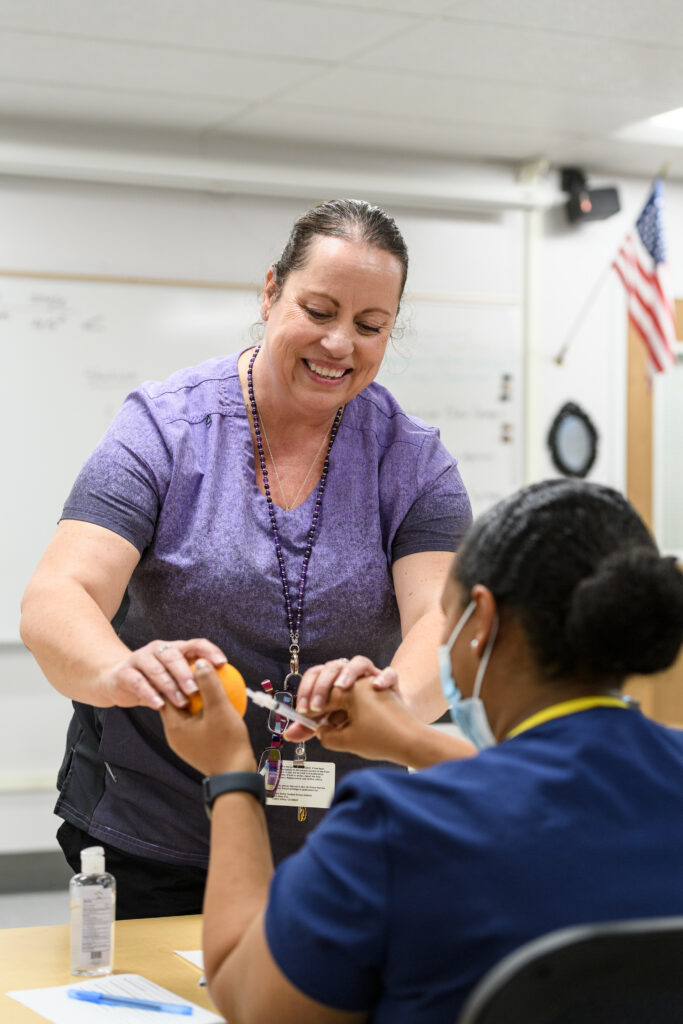
“It wasn’t my intention to get into teaching when I came to the school as a student or started working as a medical assistant, but when I was a student here, I would think to myself, ‘I think I would really like it if I was teaching here,’” Sherman recalls. “This would be something that I would want to do someday: come back and share what I learned with students.”
Sherman now co-teaches with Dasalla at the Medical Academy and they have been working together for nearly seven years.
Sherman says one of her favorite things at CVACE is the opportunity to expand what she teaches. Even though she was hired to teach in the Medical Assisting class, the school allowed her to develop an array of related courses, like Core Skills and Medical Terminology. She has also collaborated with Dasalla to develop a Community Health Worker class. But she isn’t solely dedicated to medical classes: she is currently teaching Improv at the school.
“There are so many ways to grow and explore and figure out your own passions as a teacher and the different things you want to teach to students,” Sherman explains “The administration is supportive of that and gives the tools and resources for students and faculty to be successful. There are a lot of opportunities to continue to grow and learn and expand.”
If you want to learn more about Castro Valley Adult & Career Education—as a teacher or student—visit https://www.cvadult.org/

